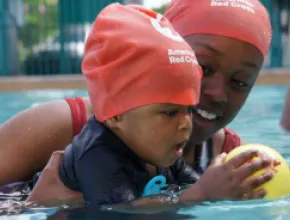Founded in 1910, the American Camp Association (ACA), has been advancing the camp experience for children, youth and adults for well over 100 years. Its diverse membership—more than 12,000 strong—shares knowledge and works together to provide people of all ages the powerful lessons in community, character and skill development and healthy living that can only be learned through the camp experience, whether that's a summer day camp program or a weeks-long sleepaway camp experience.
The association also provides accreditation, with more than 2,400 camps recognized for meeting up to 300 different standards for health, safety and program quality.
"For 111 years now, we've been very dedicated to help create a better public understanding of camp, and a higher public value for the experience," said ACA President and CEO Tom Rosenberg. "Today, it's really important to expand the reach and relevance and equitable access to camp to every young person in our country."
Recent developments at the association have obviously been heavily focused on helping the camp community continue to deliver a quality experience through the COVID-19 pandemic, but diversity and inclusion have also received close attention.
In November, the ACA announced a three-year grant program that aims to foster evidence-informed planning, testing and improving initiatives to increase access to and engagement in counselor-in-training (CIT) programs and other qualified leadership programs among young people with diverse backgrounds, abilities and identities. These training programs represent an important step taken by many campers on the way to becoming camp staff. The project aims to disrupt the pathways that currently allows some young people to more readily move through this process than others.
Grants will be awarded to up to 20 day and overnight camps, with half representing existing CIT programs and half representing new programs. Grantees will be paired, and virtual and in-person gatherings (when possible) will facilitate mentorship and collaboration. Over the next three years, grantees will design, test and improve their CIT programs and outreach initiatives.
"Camp is evolving," Rosenberg said. "There's all kinds of different camps operating. There's more diversity among camp professionals, and greater diversity in campers and in people choosing camp as a learning opportunity. Camp is part of a kid's year-long learning landscape. They have more time in summer programs like this to have independent, unstructured learning time. More opportunities to build hands-on, mind-fueled curiosity."
Of course, COVID-19 has had a heavy impact. "Last summer we saw that about 60% of day camps operated, and about 18% of overnight camps operated across the country," Rosenberg said. "Ultimately, the preliminary estimates of the economic impact shows that as a field, we lost over $16 billion in revenue, and 19.5 million youths didn't have camp experiences. That had a huge impact on the childcare system."
The hurt didn't stop there. The closures also meant a loss of more than 900,000 seasonal jobs, many for college students and recent graduates, and approximately $21 billion in downstream economic contributions to local and state economies simply vanished.
With its long history of writing standards for the field of camp, though, the ACA was quick to jump into action to help the overnight and day camps that did choose to operate to do so in the most effective, safe way possible.
"We were given an ever-evolving set of guidance from the CDC, and we could see it would take time to fully evolve, so we … convened a panel of experts to create a consensus document on how day and overnight camps should operate best to comply with CDC guidance as it evolves," Rosenberg said.
That guidance was published in the spring. Once camps were open for business, Rosenberg said, the ACA implemented several studies. The culmination of that work will be released in early January. "The ACA wanted to make sure we convened as much research as we could in the summer of 2020 to gather data to understand what made camps successful last summer to best inform planning for summer 2021," Rosenberg said. "We foresaw that there would still be COVID this coming summer. …Researchers are working now on several studies, but the most important is a public health study looking at nonpharmaceutical interventions, including cohorting, physical distancing, cleaning and disinfecting, etc. There's also another piece to that study—a business operations study. What were the adaptations to facilities or programs? What were the costs of those adaptations? What were the costs of COVID testing and additional staff?"
Keep an eye out in early January for this additional research to be made available. And if you want to get in on the knowledge-sharing and collaboration, don't miss the association's annual conference, taking place virtually this year from Feb. 2 to 4.
Visit www.acacamps.org to learn more about the association and the conference. And to learn even more about how camps were able to operate successfully through COVID-19, head over to the RecManagement.com website, where you'll find even more information from our chat with Tom Rosenberg. RM






